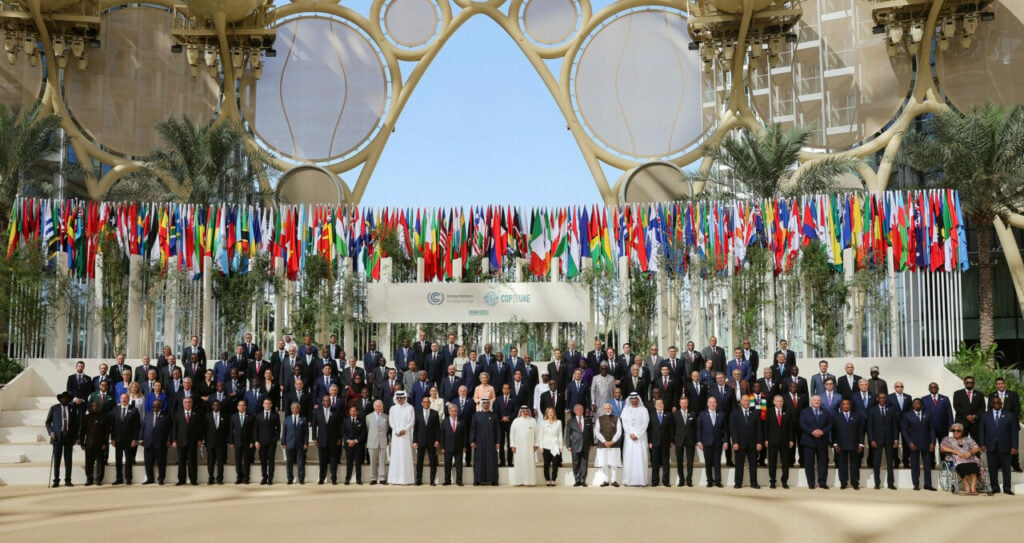The UK was one of 118 countries to sign a pledge to treble renewables to 11TW by 2030 at this year’s COP28 in Dubai.
The ‘Global Renewables and Energy Efficiency Pledge’ was signed on Saturday (2 December) in recognition of the International Energy Agency’s (IEA) recent flagship report World Energy Outlook which revealed that three times more renewable energy capacity will be required globally by 2030 to have a chance at limiting global warming to 1.5°C.
Signatory countries recognise that in order to maintain the collective goal of the Paris Agreement – which aims to keep global warming increase well below 2°C with a target to limit it to 1.5°C –, accelerating the pace renewables are deployed needs to be increased between now and 2030.
“The tripling goal would take renewables to the next level, with solar and wind reaching 40% of global electricity generation by 2030. Together, these would unlock deep economy-wide fossil fuel reductions and ensure that oil, coal and gas demand not only peak this decade but see a meaningful fall. This statement is not a substitute for a global agreement, but it does pave the way for a historic opportunity to include this in the final text,” said Dave Jones, global insights lead, at energy think tank Ember.
In the statement from the signing countries, it recognises the need to strengthen international collaboration on renewables and energy efficiency which could be taken by collaborating on resilient value chains and technology; expanding financial support to emerging markets in order to deploy renewables or accelerating cross-border grid interconnections among others.
Moreover, some of the key enablers for the world to treble renewables capacity by 2030 would be faster permitting processes for renewables, developing and expanding grid connections or providing clarity on market design and incentive schemes and strengthening market conditions and investment frameworks to facilitate investments in renewables and energy efficiency among others.
In response to the Global Pledge, the European Union announced it would invest €2.3 billion (£1.8 billion) to support the energy transition in neighbouring countries and across the globe.
Ursula von der Leyen, European Commission president, said: “In the next two years, we will invest 2.3 billion euros from the EU budget to support the energy transition in our neighbourhood and around the globe. This pledge and this financial support will create green jobs and sustainable growth by investing in technologies of the future. And, of course, it will reduce emissions which is the heart of our work at COP28.”
However, among the countries who have yet to sign the pledge are some of the most important markets such as China – which is expected to add 230GW of renewables in 2023 and is highly accelerating the growth of renewables – or India, while many emerging countries in Asia are also missing, with Indonesia, Vietnam, Thailand or the Philippines have yet to sign the pledge. Other notable nations still not on that list are South Africa, Saudi Arabia, Qatar, Russia or Egypt.
Here is the list of countries pledging to tripling renewables and doubling energy efficiency, per COP28 media desk that cannot confirm if this is the final number or not. pic.twitter.com/QJg4QANXSp
— Nuran Erkul (@enuran) December 2, 2023
“But this is just the first step in a longer journey. An ambitious pledge is even more powerful if it is backed by legally binding actions and accountability. We urge world leaders to not think that their job is done because they signed the pledge, but take the next step and include a global target to triple renewable energy capacity in the final COP documents so that we are sure countries take it seriously,” said the trade association the Global Solar Council (GSC).
The UK’s renewable commitments from COP28 so far
Alongside the ‘Global Renewables and Energy Efficiency Pledge’, they also announced a multi-million pound package of measures to encourage investment in clean technologies and protect rainforests.
These measures include, up to £40 million in new funding to the UK’s Climate Finance Accelerator, which aims to support countries finance and deliver their climate commitments under the Paris Agreement and £2 million was also promised by the UK in support of President Joe Biden’s Methane Finance Sprint to support developing countries reduce emissions in major methane-emitting industries.
The UK also joined France and the US in endorsing a global ambition to treble civil nuclear power capacity between 2020 and 2050.
In his COP28 national Statement on 1 December, Prime Minister Rishi Sunak announced an additional £1.6 billion of support for clean energy and innovation.
“I believe we can deliver here in Dubai – but we’ve got to work together. The debate is too divided, developed versus developing, ambition on mitigation versus finance for transition and adaptation. The truth is simple – we need both,” said the Prime Minister during his speech.
“In place of division, we need ambitious, collective action – like we promised in Paris and Glasgow. That’s how we’ll get back on track, by bringing everyone with us, because a truly just transition leaves no one behind.”
Part of this article was taken from our sister site PV Tech and can be read in full here.






